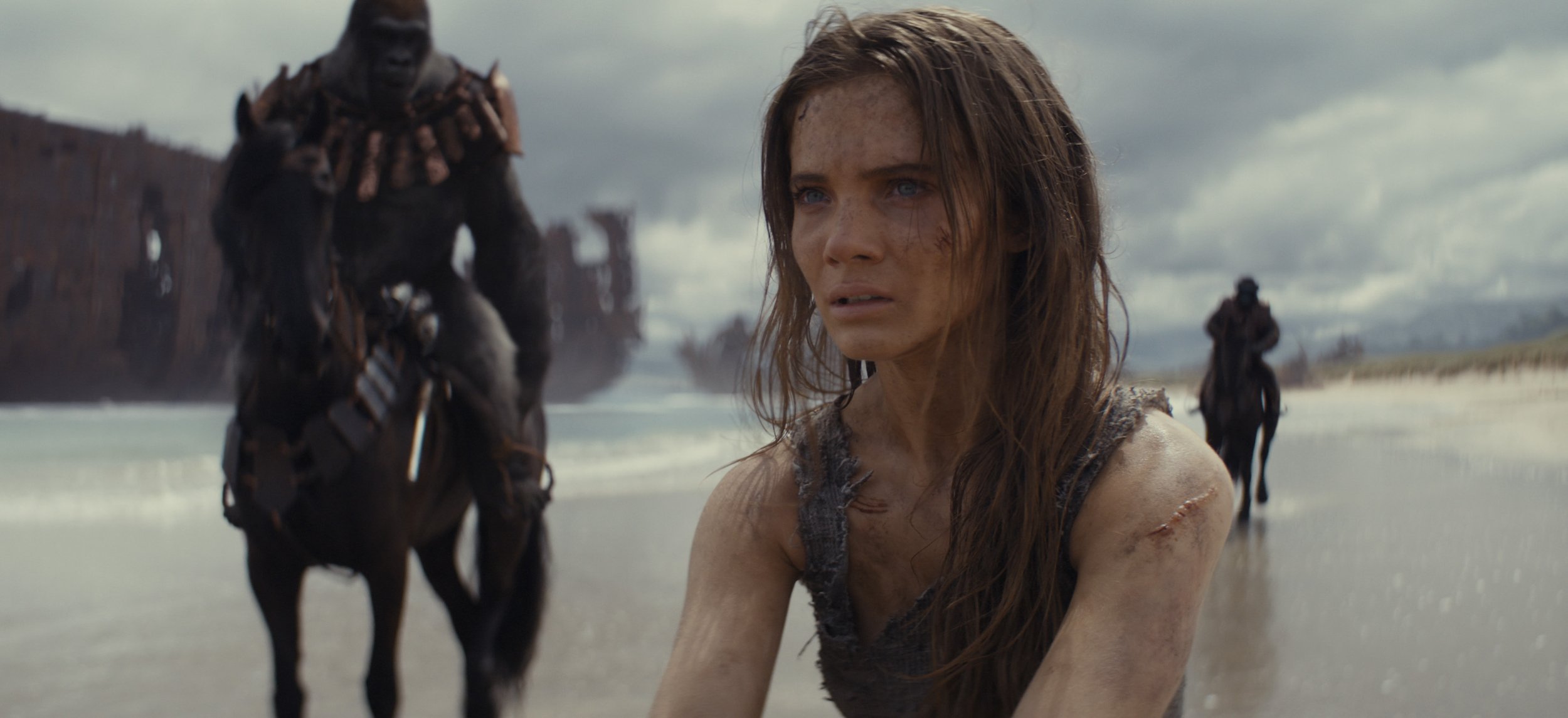Monkeying Around
Wes Ball takes up the baton for the next new ‘Planet of the Apes’ trilogy, but this one is much nicer than the last one.
Kingdom of the Planet of the Apes
Director: Wes Ball • Writer: Josh Friedman
Starring: Owen Teague, Freya Allan, Kevin Durand, Peter Macon, Willliam H Macy, Travis Jeffery, Lydia Peckham
USA • 2hrs 25mins
Opens Hong Kong May 9 • IIA
Grade: B
Setting aside, just for a moment, that none of the monkeys in Kingdom of the Planet of the Apes appear to have genitalia, therefore making “several generations” after Caesar impossible, director Wes Ball (heh heh heh) has a hard act to follow. Matt Reeves’s (mostly) rebooted trilogy – Dawn, Rise and War of/for the Planet of the Apes, starring motion capture king Andy Serkis in an unassailable performance – gave that trilogy a more grounded, more serious allegorical spin that explored God complexes, humanity’s relationship with nature and cycles of violence, with some of the best CG yet put to film, all free of hammy Hestoning. Hey, no disrespect. I love me a good “Goddamn you all to HELL!” and the man taught me all I know about the Old Testament. But the 1960s and ’70s Apes films leaned more to the silly adventure side. These Apes films have messages – or at least they did. Ball and writer Josh Friedman sidestep a great deal of the moral quandaries Caesar sunk into. And that’s fine. It’s just not as meaty as we’ve gotten used to.
Which is kind of odd when you think about it. Ball applies his Maze Runner parkour-lite filmmaking technique to the ape future created by Friedman, who has a great deal of experience with this kind of labyrinthine storytelling: Avatar: The Way of Water is based on his story, he ushered Foundation to television and he extended Snowpiercer’s life on TV, surprisingly well. Maybe he’s had enough of dystopian futures, because KofPofA is… hopeful?
Way in the future, after the meds to cure Alzheimer’s failed, after the virus (I don’t recall this) that decimated the smart human population and left the world to the primates, the word of Caesar has divided the ape population into two factions: those who live peacefully raising eagles and studying his philosophies and stuff, and those who would use his ideas for self-interest, conquest and power. No, no. This is not organised Christianity. Don’t be silly. It’s a race war! Because the lingering “Echoes” (humans) are roaming in herds or living in bunkers for safety. Or collaborating, but that’s another allegory. And they have an attitude about their ape overlords.
Anyway, our hero this time around is Noa (Owen Teague, It), a sweet-natured Eagle Clan youth, who spends his days climbing eagle aeries for eggs with his besties Anaya (Travis Jeffery) and Soona (Lydia Peckham), and respecting both nature and his tight-knit community. On the other hand, we have demagogue Donald Trump Proximus Caesar (Kevin Durand, Abigail), a clan of apes living on the coast – San Diego maybe? – and roving the countryside hunting stray humans and, by the by, looking for leftover human tech. These factions clash when Proximus’s right hand goon Sylva (Eka Darville) attacks Noa’s village and sets him on a path for revenge. Along the way he meets Raka (Peter Macon), an orangutang and follower of the true teachings of Caesar, and then his silent shadow Mae (Freya Allan, The Witcher), who Noa and Raka initially call Nova, and who you know they can’t trust. She wearing perfectly fit Capri-style jeans and a slightly ratty-yet-fashionable Uniqlo tank. What part of that doesn’t scream “ulterior motive”?
Kingdom of the Planet of the Apes is entertaining. It’s got some tremendous action – the opening forest climb and the village raid stand out – and its mo-cap performances and CGI landscapes remain some of the best in cinema. It’s easy to forget you’re watching a graphic and not a real actor. Though it is a real actor, and therein lies the rub. But that’s another issue for another SAG strike. Where it falls short compared to the Serkis-led trilogy is in its lead. Teague gets the job done as Noa, but Noa’s radicalisation comes too fast and is too cut-and-dried to really makes us contemplate his moral struggle and eventual rejection of violence. Serkis is a more seasoned actor but he also had a more layered character to work with. Noa is never wrong, he’s the victim and Proximus is bad. End of story. KotPofA is easy to digest, unlike the first trilogy, and that’s probably what makes it the perfect foundation for a new trilogy. A safer one. The closing frames look like they’re about to set up a bonkers twist that will launch us to part six but it doesn’t come close to the shock and awe of the 1968 film, if that’s what Ball and Co. were hoping for. And to add insult to injury: How dare you dangle Dichen Lachman in a small part at us, and (maybe) make us wait for Beneath the/Conquest of/Battle for the Planet of Apes for more. That’s just rude. But like Teague, the film does get the job done and reminds us how enjoyable it was to see monkeys riding horses while waving rifles. I didn’t realise I needed that in my life until I got it. — DEK



